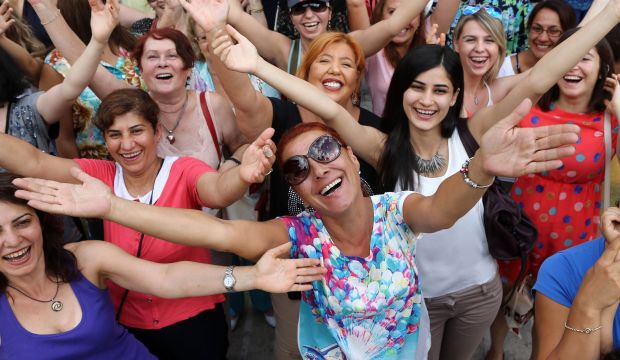There is an infection that has a positive effect on those who follow a particular hashtag—#direnkahkaha (resist laughter)—on Twitter. At least that is what happened to me.
Searching for this hashtag leads to pages full of images of Turkish women, smiling and full of life. The expressions of happiness on their faces are infectious. This is how I found myself taking a photo and tweeting it with this hashtag in solidarity with Turkish women, and the right of all women in the world to laugh and smile.
It is likely that Turkish Deputy Prime Minister Bülent Arinç has grown sick of the sight and sound of Turkish women laughing, as pictures and videos of them have filled the Internet in recent days.
Arinç, who is one of the founders of the Justice and Development Party (AKP), was giving a lecture on the second day of Eid Al-Fitr on public decency, or at least what he perceives it to be. He spoke of the necessity for women to be “chaste” in public by not talking about trivial issues on the phone in front of others, and not laughing in public either.
Ironically, this slip by the deputy prime minister caused laughter and giggles to reverberate around Turkey—and the world. Women launched campaigns to mock this view, most famously via the #direnkahkaha hashtag on Twitter.
Thousands of images and comments appeared on the Internet as women demonstrated on Turkey’s streets, laughing to show their rejection of the Turkish official’s comments.
This hashtag is also a reminder of the photo campaign launched by Iranian women who posted pictures of themselves smiling without their hijab on Twitter and Facebook. Iranian women are continuing with the “Stealthy Freedom” campaign in protest at the Iranian government’s enforcement of restrictive dress codes.
Now we have a new campaign, as another example of peaceful protest by women—one that is both positive and rooted in a political context.
How can the forces of authority confront the laughter of women? Why would any authority assume that laughter and smiling is indecent? And why do some authorities feel the need to control laughter and suppress it?
When we look at the images on Instagram of women filled with life and warm emotion, we can only feel that solidarity is pleasant, and that laughter and smiles have become a form of protest for women, especially now the campaign has attracted support from around the world.
The fact is that the call from a senior Turkish leader for women to stop laughing has dark totalitarian overtones, as laughter has often been something that has concerned dictators.
In the Middle East, the laughter of women seems most threatening to a male-dominated totalitarian mindset, whose most extreme adherent today is the leader of the Islamic State of Iraq and Syria, Abu Bakr Al-Baghdadi. However, it seems that the Turkish AKP has not escaped it either, even though it claims to espouse what it calls modern Islam.
Imagine what societies we would have if there were no laughing women.
